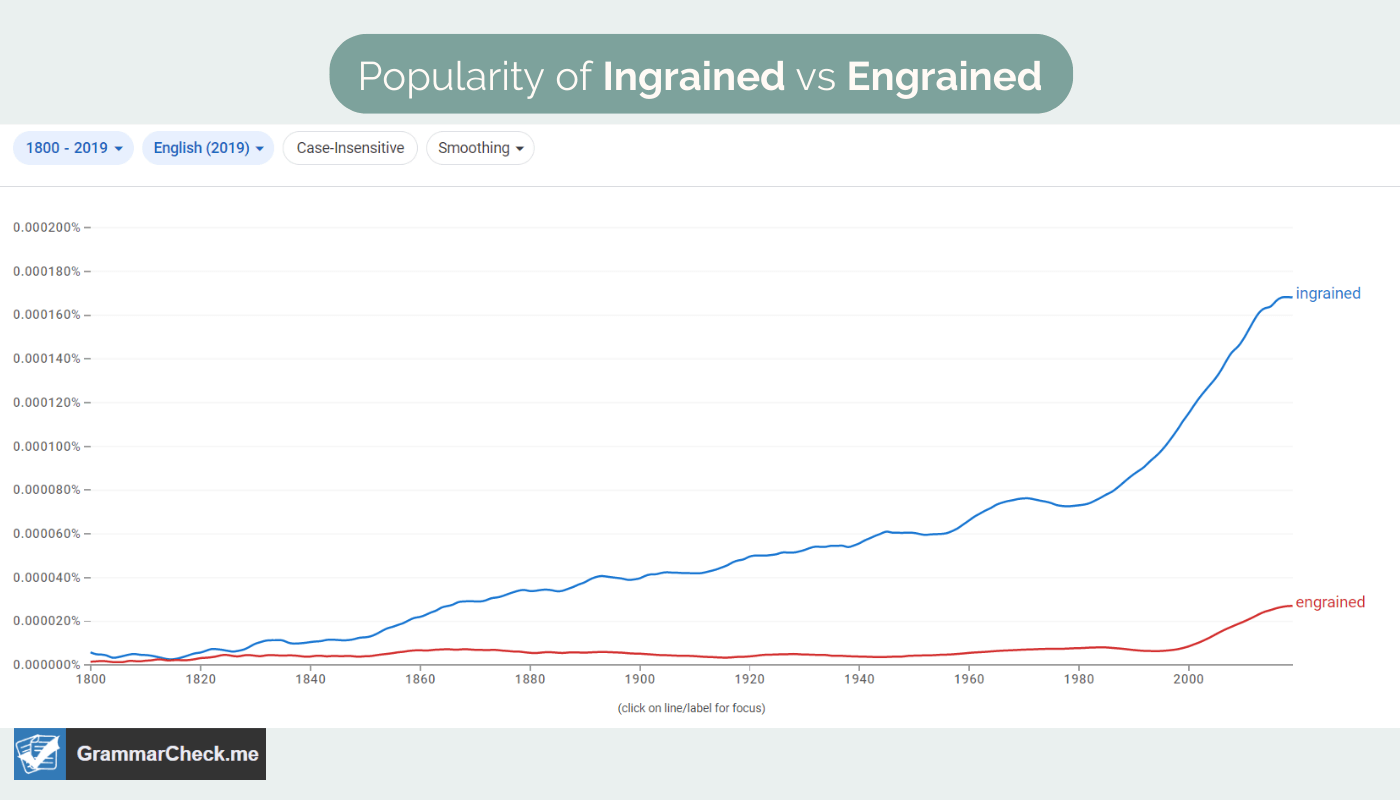Many writers get confused when trying to choose between engrained or ingrained. It’s easy to see why!
These words are one of many homophones in the English language that are pronounced the same, but have different spellings and meanings. It turns out that both spellings can be used correctly. In this post, we’ll break down the difference between these two words so that you can choose between engrained vs ingrained in your writing!
What’s The Difference – Engrained vs Ingrained?

The truth is that engrained and ingrained are two different ways to spell the same word. They are both used as verbs to describe something that has become so deeply ingrained that it is difficult or impossible to remove.
- “His belief was so deeply engrained that no one could change it.”
- “His belief was so deeply ingrained that no one could change it.”
Ingrained is the more popular spelling compared to engrained, according to data from Google Ngram Viewer. This is likely due to the fact that ingrained is a much more common spelling, and it has been used more frequently in published works. Just like with our analysis of rarer or more rare, the Ngram data is often surprising!
Engrained also means to firmly establish in someone’s or something’s nature or habit. It can also mean deeply rooted or firmly fixed. However, this spelling is far less common than the word ingrained.
How To Use Engrained
Engrained means deeply and firmly established; or ingrained. It can also mean to be deeply rooted or instilled in someone’s character or habits.
The word engrained is a descriptive adjective that is often used in written and verbal communication. Although this spelling is far less common than ‘ingrained’ internationally, it is more popular in the US. This highlights some of the spelling habits in British English & American English rules!
Depending on where you live in the world, many words are spelled differently. Take pedaling a bike for example. In the UK it is spelled pedalling!
Sentence Examples
- The engrained belief in the superiority of one’s own culture had been passed down from generation to generation.
- His work ethic was so engrained that he was always punctual and reliable.
- Her positive attitude was so engrained that she remained optimistic even in difficult times.
- The habit of exercise was so engrained in his routine that he felt uncomfortable if he didn’t exercise each day.
- The values of honesty and integrity were engrained in him from a young age.
Just like we saw in our analysis of morning vs mourning, spelling makes a huge difference. Pay close attention to commonly confused homophones!
How To Use Ingrained

As we have already mentioned, Ingrained means deeply rooted or firmly established in one’s mind, feelings, or behavior. Ingrained is the past tense just like the phrase I missed you.
This is the most popular spelling across the world in books, newspapers, articles, and casual conversation. Although the alternative spelling ‘engrained’ is technically correct, ‘ingrained’ should be used in most formal writing situations! Just like the words auntie or aunty, both spellings can be used correctly.
One common memory trick is to look at the prefix in. If you can remember the following phrase, you never make this spelling mistake again!
In is ingrained in the English language!
Sentence Examples
- Her ingrained sense of morality was evident in all of her actions.
- His ingrained respect for authority was never questioned.
- It was ingrained in her to always be punctual.
- His ingrained loyalty to his friends was admirable.
- The people of Chicago have a deeply ingrained distrust of the Police force.
Frequently Asked Questions
Engraved and ingrained both mean that something is deeply embedded in the mind and difficult to forget. You should say that something is ingrained in your brian. To ingrain means to impress deeply upon someone or something.
Deeply ingrained means something that is strongly established or firmly rooted in someone’s mind or behavior. It is an idea or belief that is so deeply established that it is difficult to change. It is a middle english word that has been used for hundreds of years.
In a sentence, you could use the word “ingrained” like this: “The habits he had developed over the years were so ingrained that it was almost impossible to break them.” This spelling is widely recognized in the British English speaking world.
Here are some words you can use instead of ingrained: Instilled, Implanted, Inculcated, Grounded, Impressed, Imbued, Fixed, Naturalized, and Rooted.
The Bottom Line
By now you know that both engrained and ingrained are acceptable spellings, just like the words in case & incase. These words are usually used in adjective form to indicate that something is embedded into someone’s habits or personality. In most situations, you should be using the word ingrained. However, both are considered acceptable spellings!
